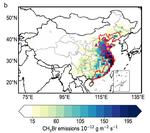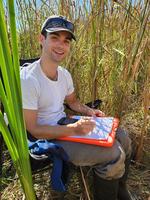Atmospheric Biogeochemistry & Composition
Our Atmospheric Biogeochemistry and Composition Laboratory quantifies sources and sinks of environmentally important trace gases, determines the biological and environmental controls on those fluxes, identifies the biochemical and abiotic mechanisms involved, and assesses impacts of land use and climate change on emissions. The ABC lab is now associated with the AGAGE research program to measure background trace gases in the global atmosphere.
Trace gases are central to global environmental issues (climate change, stratospheric ozone depletion and the atmospheric oxidation capacity) as well as regional air pollution (urban smog and acid rain). They also serve as indicators and regulators of ecosystem function and health (net primary production, ecosystem stress, plant communication).
Our trace gas biogeochemistry research addresses questions at all of these scales, from mechanistic studies at the molecular scale, to fluxes measured at the plant to ecosystem scale, to an understanding of atmospheric sources and sinks at the global scale. Our recent work focuses on the biogeochemistry of halocarbons, hydrocarbons, and reduced sulfur compounds. These are radiatively active compounds, either directly as greenhouse and/or ozone-depleting compounds, or indirectly through the production of ozone and/or aerosols. This work is essential to understanding how these chemicals move and interact in the global environment, and this knowledge is a prerequisite to making sound policy decisions to protect ecosystem and human health.
NEW: Rhew has merged his research program with the Advanced Global Atmospheric Gases Experiment (AGAGE), an international research program to monitor the trace gas composition of the global atmosphere, with an emphasis on the Montreal Protocol and non-CO2 greenhouse gases.
- Scripps Institution of Oceanography
- University of California, San Diego
- Advanced Global Atmospheric Gases Experiment (AGAGE)
- Rhew’s SIO website
Interested in joining our laboratory?
For Prospective Graduate Students, note that the Department of Scripps Institution of Oceanography is organized into three academic programs:
PROGRAM AREAS
Our lab is in the Climate-Ocean-Atmosphere Program, specifically the Climate Sciences (CS) curricular group.
We are also part of the GEO Program, specifically the MCG Marine Chemistry and Geochemistry curricular group
When applying for a PhD, decide which curricular group you most closely identify with, and select the professors of interest in your application.
We are looking for graduate students who are interested in instrument development to measure trace gases at the part-per-billion to part-per-trillion level, and using advanced instrumentation to address unknowns about Earth’s atmospheric composition and biogeochemical cycles.
Latest News
Recent postings




